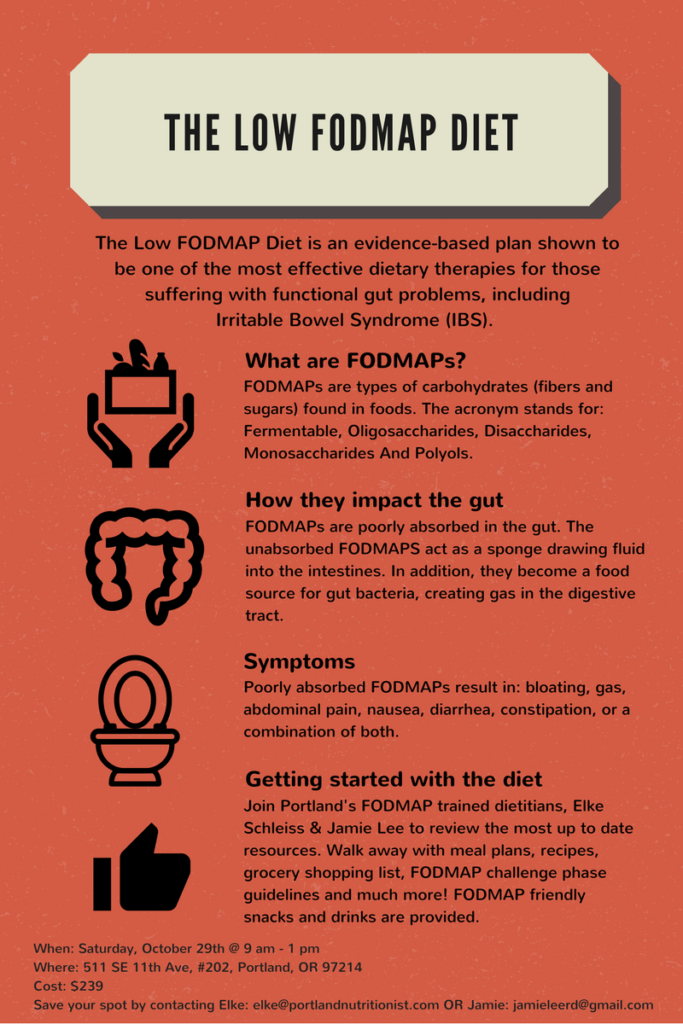The FODMAP diet - frequently asked questions
WHAT IS THE LOW FODMAP DIET?
The Low FODMAP diet was developed by researchers at Monash University. They provided initial evidence that a Low FODMAP diet improves Irritable Bowel Syndrome (IBS) symptoms. IBS is a common functional gastrointestinal disorder; characterized by chronic and relapsing symptoms; lower abdominal pain and discomfort, bloating, gas, distention and altered bowel habit (ranging from diarrhea to constipation)
This video nicely illustrates FODMAPs impact on the gut: The FODMAP Grand Tour Down Under.
IS THERE EVIDENCE FOR THE FODMAP DIET?
The Low FODMAP diet is the most researched nutrition intervention for digestion. In fact, specific FODMAPs have been identified as IBS triggers as far back as 1965. The first study to examine the efficacy of a complete low FODMAP diet for IBS was published in 2010. Monash University, in Melbourne Australia, has published multiple studies and continues to produce positive outcomes, showing the diet is an effective dietary strategy for managing IBS symptoms. 75% of folks with IBS will reduce symptoms. As a bonus, the results from Monash University have been replicated at several research facilities around the world.
WHAT IF MY SYMPTOMS ARE NOT RELATED TO IRRITABLE BOWEL SYNDROME (IBS)?
The diet was designed to reduce symptoms of gas, bloating, distention, digestive distress and altered bowels (constipation, diarrhea). There is emerging research showing the FODMAP diet is appropriate for other gastrointestinal (GI) conditions, like ulcerative colitis, coeliac disease, and small intestinal bacterial overgrowth (SIBO). If you are unsure of the appropriateness, feel free to contact me for a screening to ensure the low FODMAP diet is the best plan to manage your symptoms. I am more than willing to collaborate with your health care providers to assess appropriateness of the diet.
WHAT IF I TRIED THE DIET AND IT DID NOT WORK?
The low FODMAP diet needs to be delivered by a registered dietitian with an expertise in this area. Too often, people are given outdated information or did not have the resources needed to fully implement the diet. It is easy to inadvertently eat FODMAPs, because the diet is quite confusing without adequate guidance. This is one of many reasons Elke Schleiss RDN, LD and I (Jamie) created our low FODMAP workshop. There is also the chance that the diet will not reduce symptoms for 25% of those with IBS. This is why we like to take a holistic approach, looking at eating patterns, sleep hygiene, stress, eating behaviors and more.
WHAT TRAINING DO ELKE & JAMIE HAVE?
Elke and I have over a decade of experience in medical nutrition therapy and, in addition, have thorough training in digestive health. We are licensed and registered dietitians who have completed advanced FODMAP training with both Kate Scarlata RDN and Patsy Catsos MS, RDN, LD (both considered to be experts in the field domestically and internationally). We recently attended the 2016 University of Michigan Gastrointestinal Conference, a 3-day training in current understandings of pathophysiology and treatment of GI disorders and food allergies and “sensitivities.” Put together by researchers and leaders in digestive health. Additionally, we stay abreast of digestive health advances by reading the research, and attending and speaking at digestive health events.
THE LOW FODMAP DIET IS A DIET; CAN I EXPECT TO LOSE WEIGHT?
The diet is not a weight loss plan. Yes, we used the word “diet” because the “Low FODMAP Diet” is a universal term/title, based on the thorough research done and being done at Monash University. We opted not to change the terminology in order to stay consistent with how this dietary intervention is termed throughout the GI treatment discipline.. Diet, by definition, means “the foods and drinks people consume”. We are in no way promoting a shame-based, weight-loss centric plan..
WILL I FOLLOW THE DIET FOREVER?
The low FODMAP diet is NOT a forever diet. It was designed as an experiential diet to determine one’s tolerance to short-chain carbohydrates. The research is clear that following the diet for more than 6-8 weeks can have negatively impact the gut micro-flora. Some FODMAPs have a prebiotic effect (beneficial food source for our gut microflora), so a strict low FODMAP diet should NOT be followed for the long-term. The goal is to create the most varied, liberalized diet as possible without provoking symptoms. This is accomplished by implementing the diet as it was fully intended by incorporating the challenge phase of the low FODMAP diet.
WHAT IF I HAVE AN EATING DISORDER?
The low FODMAP diet is not appropriate for someone with an active eating disorder as the digestive conditions seen with an eating disorder mimic those of IBS. If you have a history of an eating disorder we ask that you schedule an initial assessment with myself or Elke to ensure eating patterns and behaviors are not contributing to symptoms; or receive approval from your current dietitian and therapist.
HOW DO I IMPLEMENT THE DIET?
Elke and I are offering a Low FODMAP Diet Workshop every other month. Our next workshop is scheduled for Saturday, October 29th, from 9 am to 1 pm. You will receive practical, hands-on information to implement and challenge the low FODMAP diet. This includes meal planning, grocery shopping list, label reading and much more. The flyer, below, provides additional information. Please, feel free to reach out to me to register, contact me.

